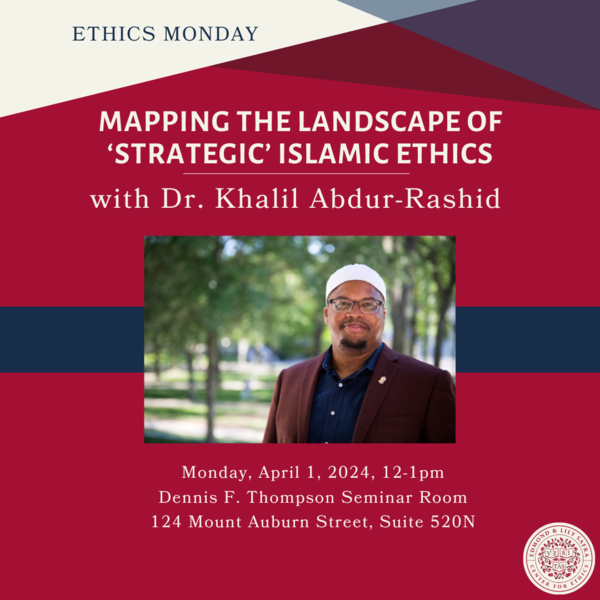Date:
Location:

Register for In Person Attendance
Register for Virtual Attendance
Islamic ethics is derived from Islamic jurisprudence, the teachings of Sufism, Arabic linguistics, social context, and Muslim International law & foreign policy. This presentation will feature a basic overview of the maxims and principles of ‘strategic Islamic ethics’ that relates to governance and conflict resolution. ‘Strategic’ Islamic Ethics is based in the assumption that effective governance and conflict resolution for Muslim nations begins with pursuing what’s in the best interest of the public, thereby elevating the public well-being and interest as a primary goal in statecraft and judicial legislation. It also marks a major shift in Islamic jurisprudential philosophy away from a human-rights centered paradigm towards a human-freedoms centered one.
Dr. Khalil Abdur-Rashid serves as one of the two Muslim Chaplains at Harvard University. He is also the Public Policy Lecturer at the Harvard Kennedy School. He was born and raised in Atlanta, Georgia. Dr. Khalil completed his Doctorate in Liberal Studies in American Islam from Southern Methodist University and holds both a Master of Arts in Islamic law and Middle East Studies as well as a Master of Philosophy in Islamic Law and Middle East Studies from Columbia University. He pursued Islamic studies not only academically but has also completed traditional studies in Islamic law and its ancillary disciplines, which led him overseas to study in Islamic seminaries for numerous years in the Middle East and in Istanbul, Turkey. While in Istanbul, Dr. Khalil pursued a master’s degree in Comparative Islamic Law at Marmara University and completed two advanced Islamic seminary doctoral licenses (ijaza) in Islamic Sciences. He has over 15 years’ experience working in higher education as an instructor of Islamic studies. He is often consulted on a wide range of topics related to Islamic law in the medieval and modern era, as well as Islam in America.
A light lunch will be served. Registration is required for both in person and virtual attendance.
